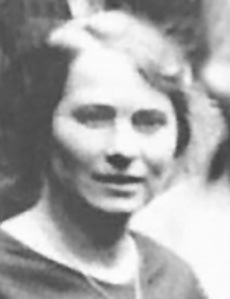Sabina Spielrein
| Sabina Spielrein | |
|---|---|
 |
|
| Born | Sheyve (Elisheva) Naftulovna Spielrein 25 October 1885 OS Rostov-on-Don, Russian Empire |
| Died | 11 August 1942 (aged 56) Zmievskaya Balka, Rostov-on-Don, Soviet Union |
| Citizenship | Russian |
| Nationality | Russian |
| Fields |
Psychotherapy Psychoanalysis |
| Institutions | Rousseau Institute |
| Alma mater | University of Zurich (M.D., 1911) |
| Doctoral advisor |
Eugen Bleuler Carl Jung |
| Notable students |
Alexander Luria Lev Vygotsky |
| Known for |
death instinct child psychotherapy psycholinguistics |
| Influences |
Carl Jung Sigmund Freud |
| Influenced |
Carl Jung Sigmund Freud Jean Piaget |
| Spouse | Pavel Nahumovich Sheftel |
Sabina Nikolayevna Spielrein (Russian: Сабина Николаевна Шпильрейн, also transliterated "Shpilrein","Shpilrain" or "Shpilreyn"; 25 October 1885 OS – 11 August 1942) was a Russian physician and one of the first female psychoanalysts.
She was in succession the patient, then student, then colleague of Carl Gustav Jung, with whom she had an intimate relationship during 1908-1910, as is documented in their correspondence from the time and her diaries. She also met, corresponded, and had a collegial relationship with Sigmund Freud. One of her more famous analysands was the Swiss developmental psychologist, Jean Piaget. She worked as a psychiatrist, psychoanalyst, teacher and paediatrician in Switzerland and Russia. In a thirty-year professional career, she published over 35 papers in three languages (German, French and Russian), covering psychoanalysis, developmental psychology, psycholinguistics and educational psychology. Her best known and perhaps most influential published work in the field of psychoanalysis is the essay titled "Destruction as the Cause of Coming Into Being", written in German in 1912.
Although Spielrein has been mainly remembered on account of her relationship with Jung, she is now increasingly recognized as an important and innovative thinker who was marginalized in history because of her unusual eclecticism, refusal to join factions, feminist approach to psychology, and her death in the Holocaust.
She was born in 1885 into a wealthy Jewish family in Rostov-on-Don, Russian Empire. Her mother Eva (born Khave) Lublinskaya was the daughter and granddaughter of rabbis from Yekaterinoslav. Eva trained as a dentist, but did not practise. Sabina's father Nikolai (born Naftul) Spielrein was an agronomist. After moving from Warsaw to Rostov, he became a successful merchant. On her birth certificate, Sabina appeared as Sheyve Naftulovna, but throughout her life and on official documents she used the name Sabina Nikolayevna. She was the eldest of five children. All three of her brothers later became eminent scientists. One of them, Isaac Spielrein, was a Soviet psychologist, a pioneer of work psychology. From her early childhood, Sabina was highly imaginative and believed that she had a 'higher calling' to achieve greatness, and she communicated about this privately with a 'guardian spirit'. However, her parents' marriage was turbulent and she experienced physical violence from both of them. She suffered from multiple somatic symptoms and obsessions. Some commentators believe she may have been sexually abused by someone in the family. She attended a Froebel school followed by the Yekaterinskaya Gymnasium in Rostov, where she excelled in science, music and languages. She learned to speak three languages fluently. During her teens, she continued to be troubled emotionally and became infatuated first with her history teacher, then with a paternal uncle. While at school, she resolved to go abroad to train as a doctor, with the approval of her rabbinic grandfather. At the end of her schooling she was awarded a gold medal.
...
Wikipedia
